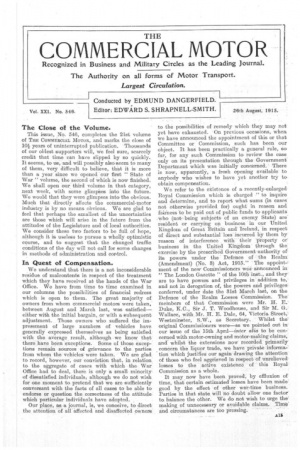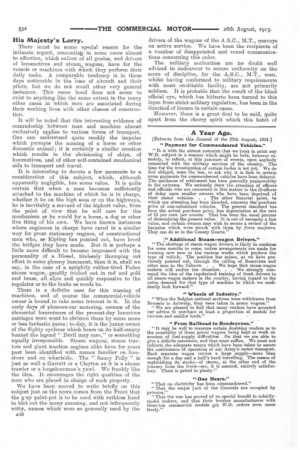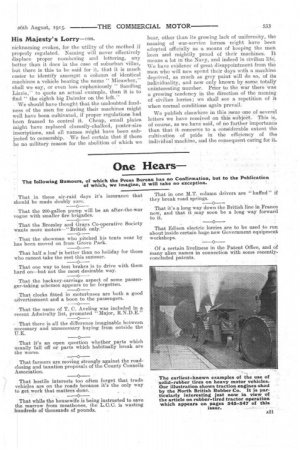The Close of the Volume.
Page 1

Page 2

Page 3

If you've noticed an error in this article please click here to report it so we can fix it.
This issue, .No. 546, completes the 2ist volume of TILE COMMERCIAL MOTOR, and. marks the close of 10i years of uninterrupted publication. Thousands of our oldest supporters will, we fee] sure, scarcely credit that time can have slipped by so quickly. It seems, to us, and will possibly also seem to many of them, very difficult to believe, that it is more than a year since we opened our first " State of War "volume, the second of which is now finished. We shall open our third volume in that category, next week, with some glimpties into the future. We would that they were glimpses into the obvious. Much that directly affects the commercial-motor industry is by no means obvious. We are glad to feel that perhaps the smallest of the uncertainties are those which will arise in the future from the attitudes of the Legislature and of local authorities. We consider these two factors to be full of hope, although it is useless to pursue a wholly optimistic course, and to suggest that the changed traffic conditions of the day will not call for some changes in methods of administration and control.
In Quest of Compensation.
We understand that there is a not inconsiderable residue of malcontents in respect of the treatment which they have received at the hands of the War Office. We have from time to time examined in our columns the possibilities of financial redress which is open to them. The great majority of owners from whom commercial motors were taken, between August and March last, was satisfied— either with the initial bargain, or with a subsequent adjustment. Those owners who suffered the impressment of large numbers of vehicles have generally expressed themselves as being satisfied with the average result, although we know that there have been"exceptione. Some of those exceptions remain sources of grievance to the parties from whom the vehicles were taken. We are glad to record, however, our conviction that, in relation to the aggregate of cases with which the War Office had to deal, there. is only a small minority. of dissatisfied individuals; although we do not wish for one moment to pretend that we are sufficiently conversant with the facts of all cases to be able to endorse or question the correctness of the attitude. which particular individuals have adopted.
Our place, as a journal, is, we conceive, to direct the attention of all affected and disaffected owners' to the possibilities of remedy which they may not yet have exhausted. On previous occasions, when we have announced the appointment of this or that Committee or Commission, such has been our object. It has been practically a general rule, so far, for any such Commission to review the case only on its presentation through the Government" Department which. was initially concerned. There is now, apparently, a fresh opening available to anybody who wishes to have yet another try to obtain compensation.
We refer to the eXistence of a recently-enlarged' Royal Commission which is charged " to inquire and determine, and to report what sums (in cases. not otherwise provided for) ought in reason and fairness to be paid out of public funds to applicants who (notbeing subjects of an enemy State) are resident or carrying on business " in our United Kingdom" of Great Britain and Ireland, in respect of direct and substantial loss incurred by them by reason of interference with "their "Property or business in the United Kingdom through the exercise by the prescribed GoVernment-authority of its powers under the Defence of the Realm (Amendment) (No. 3) Act, Igo." Tire appointment of the new Conimissioners wris announced in "The London Gazette." of the 10th-inst., and they are to have powers and privileges in addition to, and not in derogation of, the powers and privilegesconferred, under date the 31st March last, on the Defence of the Realm Losses Commission. The members of that Commission were Mr. H. E. Duke, K.C., Sir 3. T. Woodhouse, and Sir Iv.r. G. Wallace, with Mr. H. E. Dale, 64, Victoria Street,-; Westminster, S.W., as Secretary. Whilst theoriginal Commissioners were—as we pointed out in our issue of the 15th April—inter alia to be concerned with motor-owning and motor-making clairas, and whilst the extensions now recorded primarily' concern the liquor trade, we have private infornias' tion which justifies our again drawing the attention of those who feel aggrieved in respect of unrelieved losses to the active existence of this Royal Commission as a whole.
It may now have been proved, by effiuxion of time, that certain estimated losses have been made" good by the effect of other war-time business. Parties in that state will no doubt allow one factor' to balance the other. We do not wish to urge the' making of unnecessary or avoidable claims. Time' and circumstances are too pressing.
His Majesty's Lorry.
There must be some special reason for the intimate regard, amounting in some cases almost to affection, which sailors of all grades, and drivers of locomotives and steam, wagons, have for the vessels or machines with which they perform their daily tasks. A comparable tendency is in these days noticeable in thecats. e of aircraft and their pilots, but we do not recall other very general instances. This same bond does not seem to exist to anything like the same extent in the many other cases in which men are associated during their working lives with other classes of construction.
It will be noted that this interesting evidence of comradeship .betWeen man and machine almost exclusively applies to _various forms of transport. One can understand quitereadily the impulse which prompts the naming of a horse or other domestic animal; it is certainly a similar emotion which results in the christening of ships, of locomotives, and of other sell-contained mechanical aids to transport and travel.
It is interesting to devote a few moments to a consideration of this subject, which, although apparently negligible, has some value. It is quite certain that when a man becomes sufficiently attached to the machine of which he is in charge, whether it be on. the high seas or on the highways, he is inevitably a servant of the highest value, from the point of, view that he will care for the mechanism as he would for a horse, a dog or other live thing of his own. We have known instances where engineers in charge have cared in a similar way for great stationary engines, of constructional men who, as Kipling has pointed out, have loved the bridges they have made. But it is perhaps a little more difficult to become impressed with the personality of a Diesel, tirelessly thumping out effort in some gloomy basement, than it is, shall we say, in the case of a sprightly rubber-tired Faden steam wagon, .gandily tricked out in red and gold and brass, all alive and quickly responiive to the regulator or to the brake as needs be.
There is a definite case for this naming of machines, and of course the commercial-vehicle owner is bound to take some interest in it. In the early days of pleasure-car motoring, owners of the elemental forerunners of the present-day luxurious carriages were wont to christen them by some more or less fantastic _narne ; to-day, it is the junior, owner, of the flighty cyclecar which bears on its half-empty bonnet the legend " Devil may care," or something equally irresponsible. Steam wagona, steam tractors and giant traction engines alike have for years • past been -identified with names familiar on _foreshore and on .wharfaide.: ,The " Saucy Polly just as well a Garrett or a Clayton as it is a steam trawler or alongshoreman's yawl. We frankly like the idea. It .encourages the right qualities of the men who are placed in charge of such property. We have been moved to write briefly on this subject just as the news .comes from the Front that the g!ey paint-pot is to be used with ruthless band to blot out the many amusing, and not infrequently witty, names which were so generally used by the drivers of the wagons of the A.S.C., M.T., convoys on active service. We have been the recipients of a number of disappointed and vexed communications concerning this order.
The military authorities are no doubt well advised to endeavour to Secure uniformity on the scare of discipline, for the'A-S.C., MT., men, whilSt having conformed to military requirements with most creditable facility, are not primarily soldiers. It is probable that the result of the blind official eye, which has hitherto been turned to this lapse from strict military regulation, has been in the direction of licence in certain cases.
However, there is a great deal to be said, quite apart from the cheery spirit which this habit of nicknaming evokes, for the utility of the method if properly regulated. Naming will never effectively displace proper numbering and lettering, any better than it does in the ease of suburban villas, but there is this to be said for it, that it is much easier to identify amongst a column of identical Machines a vehicle bearing the name " Micawber," shall we say, or even less euphoniously " Sandbag Lizzie:. to quote an actual example, than it is to find " the eighth big Daimler on the left."
We should have thought that the undoubted fondness of the men for naming their machines might well have been cultivated, if proper regulations had been framed to control it. Cheap, small plates might have replaced clumsily-chalked, poster-size inscriptions, and all names might have been -subjected to. censorship. We feel certain that if there be no military reason for the abolition of which we hear, other than its growing .lack of uniformity, the naming of war-service lorries might have been adopted officially as a means of keeping the Men keen and mightily proud of their machines. It means a lot in the Navy, and indeed in civilian life... We have evidence of great disappointment from the men who will now spend their days with a machine deprived, as much as grey paint will do so, of its individuality, and now only known by some totally uninteresting number. Prior to the war there was a growing tendency in the direction of the naming of civilian lorries; we shall see a repetition of it when normal conditions again prevail.
We publish elsewhere in this issue one of several letters we have received on this stibjeCt. This is, of course, as we have said, of no further importance than that it concerns to a considerable extent the cultivation of pride in the efficiency of the individual machine, and the consequent caring for it..






















